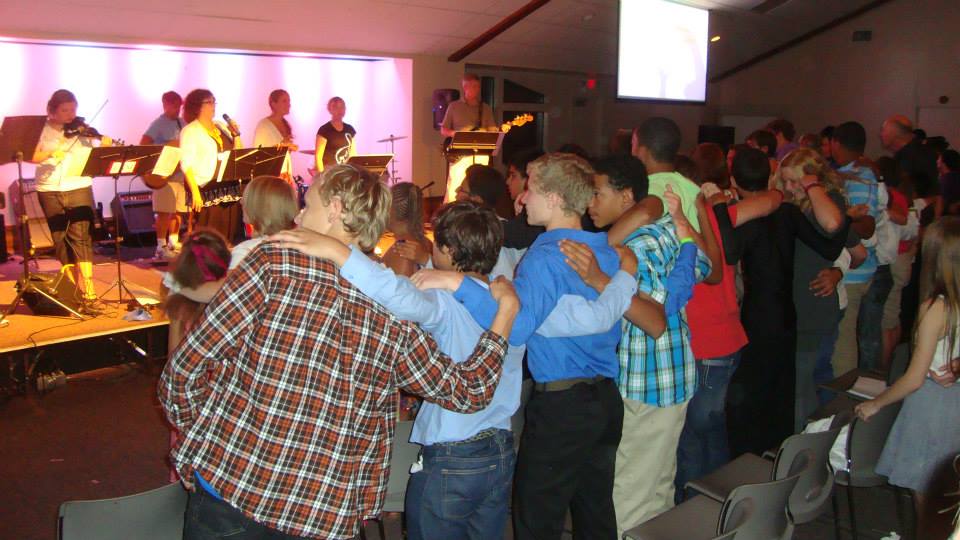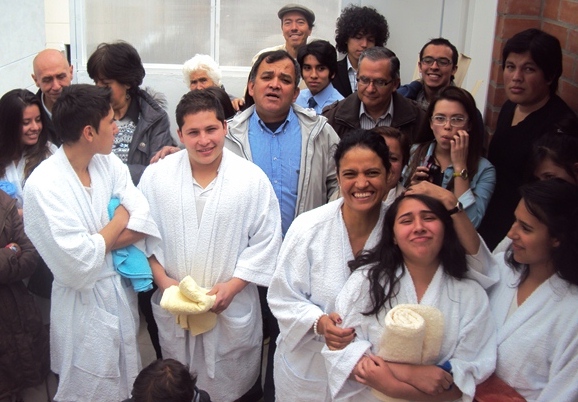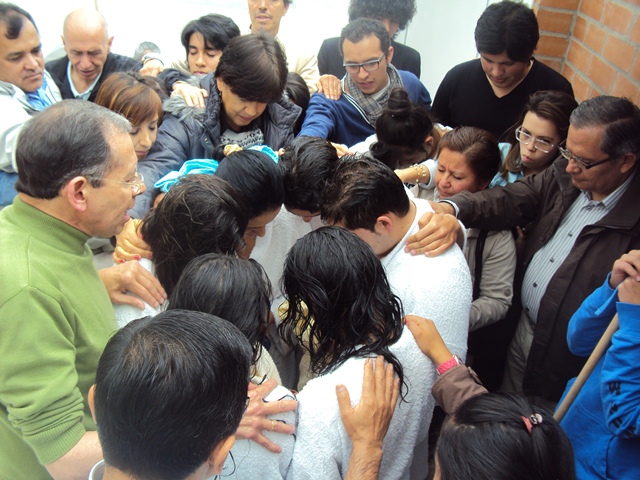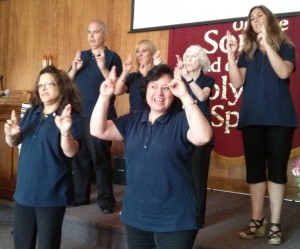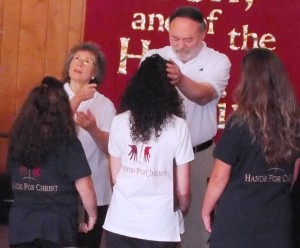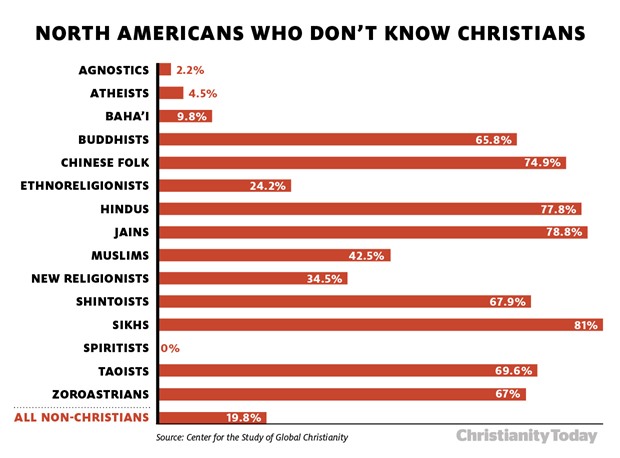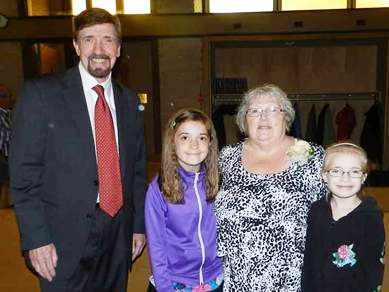By Gary Deddo
Following centuries of debate, it seems that Christians still have not settled on how best to speak about the connection between grace (faith in God’s grace in Jesus Christ) and obedience. Biblically grounded Christian teachers certainly recognize that salvation is God’s work and that it is received by faith. They also recognize that the resulting life with Christ involves obedience. The problem arises in how to affirm the one without denying (or severely qualifying) the other. The challenge is avoiding either lawlessness (antinomianism) or works-righteousness.
Both-and?
Most recognize the validity of both grace and obedience (faith and works). Rather than going the “either-or” route, most embrace some form of the “both-and” approach. However, this approach typically has little to say about the “and”—about how grace and obedience are actually connected. The result is that grace and obedience are artificially laminated together or stacked on top of one another. It is as if they are put into a room together and told to “get along.” Following this approach, efforts to correct perceived errors on one side typically involve emphasizing the other. If the perceived problem is too much works, then grace is emphasized. If it’s too much grace, then obedience is emphasized. In similar fashion, various ministries emphasize one or the other, depending upon which they think is more dangerous or prevalent. I find that the result of this approach is a sort of “seesaw theology” where the connection between law (works) and grace (faith) remains vague if not altogether absent.
In contrast, I find that the Bible deeply relates and integrates grace and obedience as fundamental to Christian faith and life. For example, in Romans 1:5 and 16:26 the apostle Paul says that bringing about this integration was the goal of his ministry. In 14:23 he says that any obedience that does not spring from faith in grace is sin! Hebrews 11 offers illustrations of people who obeyed God “by faith.” Then in 1 John 5 we are told that God’s commands are not burdensome because of the victory of faith in God’s grace (vv 3-4). Jesus himself reminds us that his burden is easy and his yoke light (Matthew 11:29-30) and that we are God’s “friends,” not his slaves (“servants”—see John 15:15 The Message). Then in Galatians, Paul tells us that “faith is made effective through love” (5:6 NRSV, footnote).
The nature of “AND”
There are dozens of places in the New Testament that clearly establish this connection between grace (faith) AND obedience (love for God and for others). But how does the connection work? What is the nature of the AND? It is found in the person of Jesus who alone embodies fully the character, mind, attitude and purpose of God. The object of our faith is Jesus Christ and the essence of that faith is trusting in Jesus as God in person according to who he is and what he has done. Faith is thus our response to who Jesus is in person, word and deed. We put our trust in God because of who Jesus Christ is. And he himself is the grace of God towards us. Jesus is the gospel. He is our salvation. And we receive all the benefits of who he is as we trust in him and cast aside (repent of) all rival objects of trust. We then enjoy our union and communion with Jesus as our Lord and God. Our lives are united to him and we share in his life, participating with him in all he is doing and will do in our relationship of trust (faith). We have our being by being in fellowship and communion with Jesus, receiving from him all that he has for us, and he taking from us all that we give him. In that union and communion we are transformed, bit by bit (2 Corinthians 3:18) to share more of Christ’s own glorified human nature, his character. We can count on this on-going gracious work of Christ by the Spirit even if much still remains hidden (Colossians 3:3) and we remain mere earthen vessels (2 Corinthians 4:7).
Our view of Jesus
The problem is that people have too small a view of Jesus and thus a restricted faith in him. Though they trust him for future salvation (getting into heaven), that’s pretty much it. However, when we look closely at scripture, we see that Jesus is both Savior and Commander. Jesus saves us by grace and also commands things of us. We know that our obedience to his commands does not earn us salvation, so why is obedience important? Perhaps we think that we must obey simply because our Commander says so—because he is big and powerful and we had better obey or else! Approached in this way, obedience becomes an act of sheer will in response to the might and seemingly arbitrary will of God. This is the obedience of a slave.
The problem with this approach to obedience is that it reflects a shrunken conception of Jesus and what he offers. We need to see all of who Jesus is and all of what he offers if we are to grasp all of what we can trust him for. We begin by understanding that Jesus is Lord of the whole cosmos, the entire universe; Lord of all reality. And he has a good and loving purpose for it all. He is redeeming all things and will renew heaven and earth. He is Lord and Savior over every aspect of human life and has a purpose for every dimension of our existence. It is all to be a channel of his blessing to us and through us to others. All of it, every relationship, is meant to lead to life and life abundantly. Even our eating and drinking is to reflect the very glory of our life-giving God (1 Corinthians 10:31). Every relationship is to be a fruitful gift exchange that contributes to a fullness of life and so a fullness of love. Jesus’ authority extends into every aspect of created existence, into every dimension of life at every level: mathematical, physical, chemical, biological, animal, human, social, cultural, linguistic, artistic, judicial, economic, psychological, philosophical, religious and spiritual. And all this has its origin in fellowship and communion with God through Christ. This relationship with God through Christ works its way into every avenue of life under his redeeming lordship. God’s grace has to do with everything. That’s the foundation of a Christian worldview.
So everything we receive from God we pass on to others to contribute to God’s universe-wide purposes. This is especially true in our relationships. We receive forgiveness of sins—renewing grace to start again with hope. We receive God’s generosity providing us all the fruit of the Spirit. We receive comfort, love, transforming power and a purpose and direction in life to be a sign and witness to the grace and goodness of God. We become witnesses to the truth and holy loving character of God. And all these things point to eternal life—life with God as his beloved children in holy, loving unity.
Trust and obey
Our faith is a trust in God through Christ for all these things, not just for “going to heaven” someday. Every command of God and our every act of obedience is keyed to some aspect of what we can trust God for. We forgive because we have been and will be forgiven. We love, because we are first loved by God. We love our enemies because God first loved us and also loves (wants his best) for his and our enemies. We can be generous because God is generous with us. We can be truthful and honest because God is truthful and honest and will bring out the truth in the end. We can be creative and helpful because God is creative and helpful to us. We comfort others in their grief because God comforts us in our grief. We can be patient because God is patient with us. We can be peacemakers because God is a peacemaker. We can pursue justice and right relationships at every level, because God is just and righteous. We can be reconcilers because God is a reconciler. All our doing by faith is participating in what God is doing through Christ and in the Spirit. That means all we do is fellowship and communion with Christ. We never act alone—because we are never alone but are united to Christ as his brothers and sisters and members of the family of God.
Imperatives flow from indicatives
We obey by faith when we see all of who Jesus is in any given situation, trust him to be faithful in that situation and then act as if he will be faithful. That is, we act on our faith in who he is. You will find that, connected to every command in Scripture is some kind of reference to who God is and what he can be trusted for. Seeing the connection between what God can be trusted for and what he then directs us to do generates the obedience of faith. James Torrance spoke of this by saying that every imperative of grace is built on a foundation of an indicative of grace. The reason there is always a connection is because all of God’s commands to us (the imperatives) arise out of his own character, heart, nature and purpose, including everything he has done for us in Jesus Christ (the indicatives). God is not arbitrary—his will for us always is informed and controlled by his nature and character as the Triune God who came to us in Jesus Christ that we might have fellowship and communion with him in holy love.
So faith in God’s grace arises out of a trust in God because of Jesus Christ and obedience to the God of grace arises out of a trust in God because of Jesus Christ. Thus faith and obedience have one and the same source—the faithfulness of God in Christ. They both are a response to who Christ is. They both have the same Trinitarian, Incarnational theological source. They both are the fruit of a trusting relationship with God through Christ in the Spirit.
Guidelines for preaching/teaching
Here are guidelines that I’ve developed to help keep grace and obedience together in Jesus:
- Never call for an act of obedience without first showing what we can trust God for that which corresponds to that call for action. Always look for the indicatives of grace that are the foundation for the imperatives (commands) of grace in every biblical passage.
- Always indicate the character of the gracious, saving, redeeming Commander. Never present God as a merely a commander with a strong will disconnected from his heart, mind, character and purpose, which we see in Jesus Christ. Always begin by answering the foundational question, Who are you Lord? Doing so makes our preaching and teaching truly Trinitarian and Incarnational.
- Never simply preach to a person’s will or power of choice. Behind every act of will and choice is a desire, a hope, a love, a fear, a trust or distrust. That is, behind every act there is belief or unbelief, trust or distrust in God. Preach to persons’ hearts, their affections, their yearnings concerning the character, purpose and heart of God and his desire for our fellowship and communion with him. Preach what God can be counted on; trusted for. Feed people’s faith, hope and love for God. Obedience will flow out of that.
- Do not preach: “If you…then God.” Doing so tempts people into legal obedience and works-righteousness. Instead, preach: “Since God in Christ by the Spirit…then you ____.” Or, “As you do x, y or z out of trust… you will be receiving what God offers us in Christ.” For example, say, “As we confess our sins we experience the forgiveness that God has already given us in Christ.”
- Present obedience as “going to work with God”—as an act of fellowship with God that involves us in what the Spirit of God is doing.
- Preach obedience as a “get to” not a “have to.” Preach it as the privilege of a child of God, not the grit-your-teeth duty of the slave of a willful God.
- Do not seek to motivate others on the basis of trying to close a supposed “credibility gap” between the “reality” of this fallen world and an ideal that we suppose God hopes for. It is not our calling to build the kingdom or to make God’s ideal actual. Rather, preach the reality of who God is and what he does (and has done), and the calling we have to participate with God in making visible a bit of that reality. With this approach, our only choice is to affirm and participate in the reality that God has established in Christ by the Spirit or to deny and to refuse to participate. We have no power to change that reality, but only to choose whether or not we will freely participate.
- Preach and teach the grace of God as a finished work—a reality that we can count on even if it is hidden for now. Do not teach it as a potential that God has made possible if we do x, y or z—God is not dependent upon our actions. Rather, he invites our participation in what he has done, is doing and will do. Preach like Jesus did: “The kingdom of God has come near, so repent and believe in that good news.” Preach like Peter did: “Since God has made Jesus Lord and Savior, therefore repent and believe.” Notice that the desired action is always presented as a response to who God is and what he has done.
- Never preach as if God cannot be more faithful than we are—as if God is limited by what we do or don’t do. Paul says that, “If we are faithless, he [God] remains faithful” (2 Timothy 2:13). We may miss out on being involved, but God will still accomplish his good purposes. God does not need us, but he delights in having his children involved in what he is doing. We were created for fellowship (communion, partnership) with God.
- Do not grant reality-making to human actions, as if what we do makes “all the difference.” Christ alone gets that credit. Our actions, whether they be great or small (as small as a cup of water, or a mustard seed of faith), amount only to a few loaves and fish to feed 5000. They are no more and no less than embodied signs, pointing to the coming kingdom of God. We are mere witnesses and our sign-acts are partial, imperfect, temporary and only provisional. But by God’s grace, the Spirit uses even these meager things to point people to Christ so that they may put their entire trust in him according to who he really is.
- Realize that you will have to trust mightily in the unconditioned grace of God to bring about the obedience of faith in order to preach and teach this way and not succumb to the temptation to revert back to making it sound like God’s grace is dependent upon our response (and thus conditional upon our action).
- Know that you, like Paul, will not be able to prevent some from trying to take advantage of this grace (even though taking advantage of it is not receiving it, but rejecting it!). You will also be accused by some, just like Paul was, of encouraging sin and disobedience (antinomianism)! But Paul did not change his message of grace under the pressure of such accusations. We must not attempt to prevent this rejection and abuse of grace by changing our message to a conditioned grace or an arbitrary obedience, as happened in Galatia. Making that switch would be a denial of the gospel of God in Jesus Christ.
I hope you can see how I think this biblical orientation brings together grace and obedience in an organic, personal and integrated way so that there is no “either-or” separation, nor a simplistic seesaw “both-and” juxtaposition of two different things. Those who love and trust God through Christ in the Spirit as Lord of the universe will desire to be faithful to him and with him in every dimension of life here and now, even in our current fallen condition.
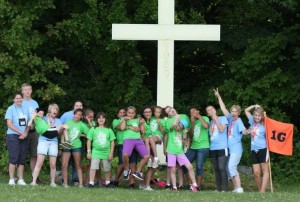 Anthony Mullins, who directs GCI Generations Ministries (GenMin), recently reported on progress in 2013:
Anthony Mullins, who directs GCI Generations Ministries (GenMin), recently reported on progress in 2013:


